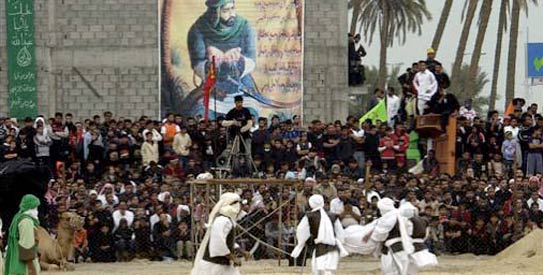
RIYADH: Saudi Arabia should embrace its Shia minority to prevent Iran from using them to destabilise the kingdom, experts said after four Shias were shot dead in clashes with police.
But they also advised Saudi security forces to clamp down on suspected armed men infiltrating protests, after the interior ministry said gunmen with foreign agendas had attacked security forces in the Eastern Province.
“The region is going through a historic phase,” said a political science lecturer at Riyadh’s King Saud University, Khaled al-Dakheel.
“This should be borne in mind when dealing with the Shia issue so that it does not become a political card for foreign parties to play,” he said, in a clear reference to Iran.
Warning that the Arab Spring which has swept the region and toppled three autocratic leaders could reach any part of the Middle East, Dakheel said the Shias should be recognised as full citizens.
“Shias are citizens. They stress that, and should be treated on these bases. But they should also voice their demands as citizens and not as Shias,” he said.
“The difference between sects is part of a social and intellectual pluralism in the society that should contribute to enrichment, not division,” he argued.
Four Shias were shot dead this week in Qatif in the Eastern Province, scene of protests. The interior ministry said security forces had come under fire from gunmen operating on “foreign orders.”
The region that is home to the majority of the kingdom’s Shia population of around two million is no stranger to uprisings, going back to 1979 with riots which came hot on the heels of the Islamic revolution in Iran.
In March, Shias in the oil-rich Eastern Province demonstrated in sympathy with fellow Shias in neighbouring Bahrain, after security forces clamped down on pro-democracy protests led by that country’s majority Shia community.
Qatif protesters were back on the street in October demanding the release of those arrested in March.
But this week, the interior ministry said two policemen were wounded by gunfire in the confrontations, in an unprecedented development.
“This is the first time that gunfire is used in a demonstration,” said the head of the Dubai-based Gulf Research Centre, Abdulaziz al-Sager.
He said the government should clamp down on gunmen, just as it did with Sunni militants from Al-Qaeda who were behind an upsurge of violence in the kingdom between 2003 and 2006.
But he also argued the government should appease the Shias.
“The government should work on the political and social front with Shia leaders who reject foreign meddling,” he said. “The government should act to prevent foreign infiltration.”
The governor of the Eastern Province, Prince Mohammed bin Fahd bin Abdul Aziz, is said to have told Shia dignitaries that the interior ministry will be probing the deaths of protesters.
The head of the Jeddah-based Middle East Centre for Strategic Studies, Anwar Eshki, blamed Iran for the unrest.
“Iran wants to cause trouble in Saudi Arabia. This is a matter that goes back more than 20 years, since the (Iranian) pilgrims were mobilised, but they have failed,” he said.
In 1987, clashes between Saudi police and Iranian pilgrims demonstrating in Mecca left 402 people dead, including 275 Iranians.
“Things appear to have developed, from demonstrations to terrorist attacks ... Saudi Arabia will deal with them in the future on the basis of being terrorists,” he said.
In Iran, a hard-line senior cleric said on Friday that the Al-Saud dynasty should give up power, warning that the fate of Egypt’s toppled president Hosni Mubarak awaits King Abdullah.
“You should give up power and leave it to the people. They will establish a people’s government,” Ayatollah Ahmad Jannati said in the weekly Muslim prayers at Tehran University.










































